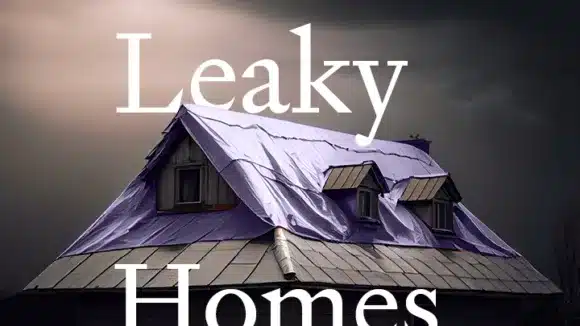Buyer beware

Remember the leaky homes crisis? That little $47 billion* oopsie that made headlines in the early 2000s? Well, hold tight, because we might be watching the sequel unfold.
Auckland’s building inspectors are sounding the alarm as 33% of new builds fail final inspections. With government reforms pushing self-certification and faster approvals, some fear we’re heading for another billion-dollar building disaster.
*Estimate from Rottenomics, written by journalist Peter Dyer.
Numbers to scare buyers
Over a third of residential new builds in Greater Auckland failed their final inspection in the year to May. That’s one in three brand-new homes that can’t even make it past the finish line without major issues.
-
27% failed on framing issues
-
25.6% botched cavity wrap
-
22.1% cladding problems
-
15.2% foundation failures
-
14.5% drainage disasters
Jeff Fahrensohn, Auckland Council’s chief building inspector, has been posting LinkedIn videos that look like outtakes from a building inspector’s nightmare. “It’s been put there to hide things that are not right with the framing. That’s just blatant concealment,” he says, pulling tape off shoddy work.
Cowboys are back in town
Building inspectors are warning of a new leaky homes scandal in the pipeline, and the parallels to the late ’90s boom are striking.
Fahrensohn’s videos are of new builds, not historic leaky-home cases – meaning these failures are happening right now, on properties that are currently for sale.
John Gray, a pilot-turned-advocate who’s been fighting building defects since 2007, knows the story. One case he’s seen involves a new house that failed 22 inspections – and yet potential buyers continue to look at it. “These builders continue to get away with it,” he said.
Government besotted with expediency
While inspectors are documenting construction disasters on LinkedIn, Building Minister Chris Penk is pushing through the biggest building reforms since 2004.
One of the most visible changes will mean builders and plumbers no longer need to wait for inspections or resource consents from local councils. Instead, they’ll be able to self-certify their work.
The government argues that this will solve New Zealand’s housing crisis by cutting the average time of 569 days for a home to be built once consented. Granny flats up to 70sqm will no longer need building consents at all.
Phil O’Sullivan from Prendos (the company that first blew the whistle on leaky homes) warns that granny flats will simply be slums of the future, saying people will not build them properly.
The liability game is changing too
Currently, when builders disappear (often through the classic “phoenix” company trick), councils – and ultimately ratepayers – get stuck with the bill. Penk told OneRoof he was considering a system of proportionate liability, where councils would only be liable for their share of the total loss.
Now it looks as though buyers are even more exposed to shonky building work than they were previously. And good luck chasing down that licensed building practitioner who’s already wound up their company and started fresh under a new name.
Gray points to Canada’s approach after their leaky condo crisis: “They make everyone licensed, so if you’re a development company, you are licensed… if they build something that fails, then those people lose their licence, and they can’t start up another company.”
Meanwhile, in Auckland, Fahrensohn and his team conduct around 200,000 building inspections a year – which is an awful lot when a large percentage of them are actually rechecks triggered by an earlier failed inspection.
Due diligence is your best friend
Pre-purchase building inspections could be the new growth sector. And if you’re thinking about new builds or developments, maybe wait to see how these reforms play out. If there’s one thing the leaky homes crisis taught us, it’s that when buildings fail, it’s not the developers who pay the price. It’s the homeowners, the investors, and ultimately, all of us.
Modern property investment requires cash flow over speculative growth and all those other good things. But more than anything, it requires a close look at what you’re buying before signing the deal. Don’t get stuck with a lemon. Call 0800 GOODWINS for a chat before taking the leap.
